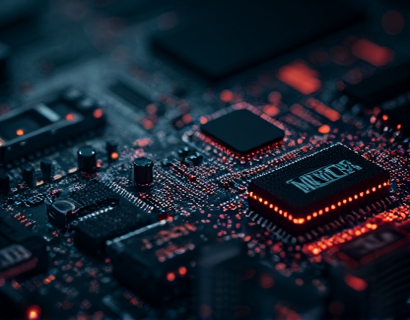AI-Driven Efficiency in Aeronautics: Transforming Business Operations with Intelligent Agent Solutions
The aeronautics industry stands at the forefront of technological innovation, constantly seeking ways to enhance operational efficiency, improve safety, and reduce costs. One of the most transformative technologies emerging in this sector is Artificial Intelligence (AI), particularly through the deployment of intelligent agent solutions. These AI-driven agents are revolutionizing business operations by streamlining processes, enhancing decision-making, and providing tailored insights that address the unique challenges faced by aeronautics companies. This article delves into the role of AI agents in the aeronautics industry, exploring how they are reshaping the landscape and offering sustainable growth and a competitive edge in a dynamic market.
Understanding Intelligent Agent Solutions in Aeronautics
Intelligent agent solutions in aeronautics refer to software entities that operate autonomously to perform tasks, make decisions, and interact with other systems or humans. These agents leverage advanced AI techniques such as machine learning, natural language processing, and predictive analytics to deliver value. In the context of aeronautics, intelligent agents can be deployed across various domains, including maintenance, operations, supply chain management, and customer service.
One of the primary benefits of intelligent agents is their ability to process and analyze vast amounts of data in real-time. This capability is crucial in an industry where timely decisions can mean the difference between operational success and failure. For instance, an intelligent agent can monitor aircraft performance data, predict potential failures, and recommend maintenance actions before issues escalate, thereby reducing downtime and maintenance costs.
Streamlining Maintenance Operations
Maintenance, Repair, and Overhaul (MRO) is a critical component of the aeronautics industry, accounting for a significant portion of operational costs. Traditional maintenance approaches often rely on fixed schedules or reactive measures, which can lead to inefficiencies and unexpected downtime. Intelligent agents can transform MRO by implementing predictive maintenance strategies.
By continuously analyzing sensor data from aircraft systems, intelligent agents can identify patterns and anomalies that indicate potential failures. These agents can then generate maintenance schedules based on actual conditions rather than predefined intervals. This approach not only optimizes maintenance resources but also extends the lifespan of aircraft components. For example, an intelligent agent might detect subtle changes in engine performance data and schedule a preventive check, avoiding a more costly emergency repair.
Moreover, intelligent agents can integrate with existing enterprise resource planning (ERP) systems to automate work orders, track parts inventory, and coordinate with maintenance teams. This seamless integration ensures that maintenance activities are executed efficiently, reducing delays and improving overall operational reliability.
Enhancing Decision-Making with Data Insights
Effective decision-making is paramount in the aeronautics industry, where complex systems and high-stakes operations require precise and timely information. Intelligent agents excel in providing actionable insights by analyzing diverse data sources and presenting them in a comprehensible format.
For instance, an intelligent agent can monitor flight schedules, weather conditions, and air traffic data to optimize flight routing and fuel consumption. By considering real-time variables, the agent can suggest alternative routes that minimize fuel usage and reduce flight times, leading to cost savings and improved customer satisfaction. Similarly, in ground operations, an intelligent agent can analyze historical data and current conditions to predict peak traffic periods, enabling better resource allocation and scheduling.
Another critical area where intelligent agents provide valuable insights is in risk management. By continuously monitoring operational data, these agents can identify potential risks and vulnerabilities, such as security threats or compliance issues. They can then recommend proactive measures to mitigate these risks, ensuring that aeronautics companies maintain high standards of safety and regulatory compliance.
Optimizing Supply Chain Management
The aeronautics supply chain is complex and global, involving numerous stakeholders and a wide range of components. Intelligent agents can significantly enhance supply chain efficiency by automating processes, improving visibility, and reducing lead times.
One key application is in demand forecasting. Intelligent agents can analyze historical sales data, market trends, and external factors such as economic indicators to predict future demand accurately. This foresight enables aeronautics companies to adjust production schedules and inventory levels, minimizing excess stock and stockouts. For example, an intelligent agent might forecast an increase in demand for a specific aircraft model based on market analysis and suggest scaling up production accordingly.
Additionally, intelligent agents can optimize logistics and transportation by coordinating with multiple carriers and tracking shipments in real-time. By analyzing traffic patterns, weather conditions, and carrier performance, these agents can select the most efficient routes and modes of transport, reducing delivery times and costs. This level of optimization is particularly beneficial for the timely delivery of critical components and spare parts.
Improving Customer Service through AI Agents
Customer service is a vital aspect of the aeronautics industry, where customer satisfaction directly impacts business success. Intelligent agents can enhance customer interactions by providing personalized support and rapid issue resolution.
For instance, an intelligent agent can be integrated into a company's customer service platform to handle inquiries, provide flight status updates, and assist with booking and reservation processes. By leveraging natural language processing, the agent can understand and respond to customer queries in a human-like manner, improving the overall customer experience. Additionally, the agent can proactively address potential issues by monitoring customer interactions and suggesting solutions before the customer even realizes there is a problem.
In cases where human intervention is required, intelligent agents can seamlessly transfer the conversation to a human agent, ensuring a smooth handover and maintaining continuity. This hybrid approach not only enhances efficiency but also ensures that customers receive the level of support they expect.
Driving Innovation through AI-Enabled Research and Development
Innovation is the lifeblood of the aeronautics industry, and AI agents play a crucial role in accelerating research and development (R&D) efforts. By automating data analysis, simulating scenarios, and generating insights, intelligent agents can significantly reduce the time and cost associated with developing new technologies and aircraft designs.
For example, in the design phase, intelligent agents can analyze vast datasets from previous models, simulations, and testing to identify optimal design parameters. They can also simulate various flight conditions and environmental factors to predict performance and identify potential issues early in the design process. This capability allows engineers to refine designs more efficiently, leading to more innovative and efficient aircraft.
Moreover, intelligent agents can facilitate collaboration among cross-functional teams by providing a centralized platform for data sharing and analysis. This ensures that all stakeholders have access to the latest insights and can contribute to the R&D process more effectively. By breaking down silos and enhancing communication, AI agents help accelerate the innovation cycle.
Challenges and Considerations
While the benefits of AI-driven intelligent agents in aeronautics are substantial, there are also challenges and considerations that need to be addressed. One of the primary concerns is data security and privacy. Aeronautics companies handle sensitive information, and ensuring the integrity and confidentiality of this data is paramount. Implementing robust security measures and adhering to regulatory standards are essential to mitigate risks.
Another challenge is the integration of AI agents with existing systems and processes. Legacy systems may require significant updates or overhauls to support AI technologies, which can be resource-intensive. Collaboration with technology partners and gradual implementation strategies can help overcome these hurdles.
Furthermore, there is a need for skilled professionals who can develop, maintain, and optimize AI agents. Aeronautics companies should invest in training and development programs to build a workforce capable of leveraging AI technologies effectively.
Conclusion
The integration of AI-driven intelligent agents in the aeronautics industry represents a transformative shift towards greater efficiency, innovation, and competitiveness. By streamlining maintenance operations, enhancing decision-making, optimizing supply chain management, improving customer service, and driving R&D, these agents are reshaping the industry landscape. As aeronautics companies continue to adopt and refine AI technologies, they will be better positioned to meet the challenges of a rapidly evolving market and achieve sustainable growth.










































